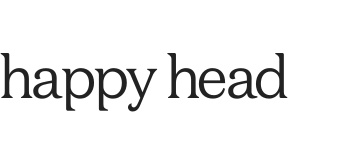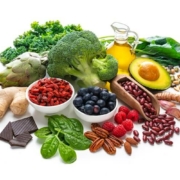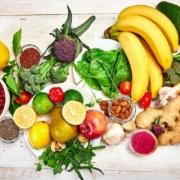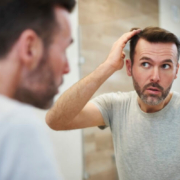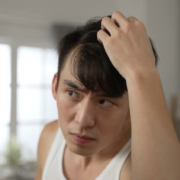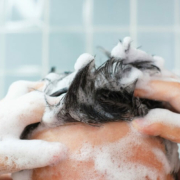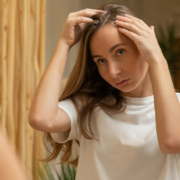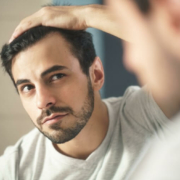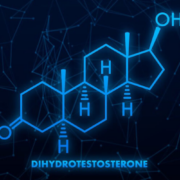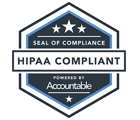The Best Superfoods for Healthy Hair
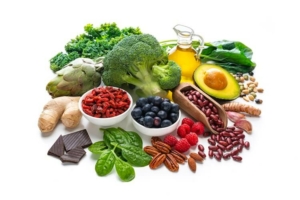
Hair loss can often leave a person feeling helpless about their appearance. Fortunately, there are lifestyle changes a person can make to encourage healthy hair growth. For example, replacing processed foods with nutrient-dense superfoods may help manage hair loss.
Nutrients for Hair Growth
Like the rest of the body, the scalp depends on vitamins and minerals from the food you eat to grow healthy hair. Hair grows out through hair follicles, and these follicles need nutrients to work well. The following are a few of the most vital nutrients necessary for hair growth.
Vitamin A
Healthy follicles are important for robust hair growth. Vitamin A ensures well-functioning follicles by promoting better blood circulation and mitigating follicle damage from free radicals. Additionally, vitamin A improves overall scalp condition, eliminating dry and scaly skin.
B Vitamins
Deficiencies in B vitamins have been linked to hair loss. B vitamins support the growth of skin, hair, and nails in two ways:
- Enhancing the body’s ability to remove nutrients from foods.
- Boost red blood cell formation.
A variety of nutrients fall under the umbrella of a B vitamin: (01)
- B1 (also known as Thiamine)
- B2 (also known as Riboflavin)
- B3 (also known as Niacin)
- B5 (also known as Pantothenic acid)
- B6
- B7 (also known as Biotin)
- B9 (also known as Folate)
- B12
Hair-friendly B vitamins help with red blood cell formation, which are vital for carrying oxygen and nutrients throughout the body— including the scalp.
Vitamin C
A healthy head of hair is nearly impossible without Vitamin C. It’s a powerful antioxidant that impacts hair growth by: (02)
- Playing a significant role in developing collagen, which is necessary for hair building and structure.
- Encouraging the absorption of iron, which prevents hair loss and oxidative stress.
Like the rest of the body, the scalp and hair is susceptible to damage from free radicals. Vitamin C helps to reduce the injury from free radicals and maintains scalp health. Furthermore, collagen is a key compound that produces keratin, which gives skin and hair cells their structure. Vitamin C amps up collagen production and helps to strengthen and grow healthy hair.
Vitamin D
Due to our modern lifestyle and diet, most people do not get enough vitamin D. Which is unfortunate, because vitamin D deficiency is linked to hair loss and slow hair growth. Participants in a study of women experiencing hair loss had lower levels of vitamin D. In another study of individuals with alopecia areata (an autoimmune condition that causes hair loss) found that vitamin D levels were also lower in individuals with the disease. (03, 04)
Iron
While many people don’t get enough vitamin D, the most common nutrient deficiency in the world is iron deficiency. Iron plays a significant role in a variety of body systems, but perhaps it’s most well-known for carrying oxygen throughout the body via red blood cells. Without iron, hair follicles can’t get the oxygen they need to grow hair. Therefore, iron deficiency results in anemia and hair loss. (02)
Zinc
Bones, muscles, the immune system, and even reproductive organs all require zinc to function appropriately. Zinc is also essential for healthy hair and skin. This mineral plays a significant role in manufacturing collagen, essential for growing hair. (02)
In addition, zinc affects the hormone dihydrotestosterone (DHT). DHT is responsible for the loss of hair in situations like male pattern. Zinc regulates the activity of the enzyme that keeps DHT in check, 5-alpha reductase.
Seven Superfoods for Hair Loss
The good news is that you can easily obtain these vital hair nutrients by incorporating the following superfoods in your diet. You’ll find some predictable foods on this list, as well as some you may not have expected to be hair-growing superfoods!
1 Nuts and Seeds
In general, nuts and seeds are high-protein and nutrient-dense superfoods. When it comes to hair, however, they’re chock full of the nutrients necessary for long, shiny hair. Nuts and seeds are high in B vitamins, iron, zinc, selenium, and omega-3 fatty acids. Just keep your intake to a handful a day, because nuts and seeds are also high in calories.
2 Healthy Cuts of Meat
Meat gets a bad rap. Although it’s true that fatty or heavily processed meats adversely affect a person’s health, this is not the case for all types of meat. Moderate amounts of healthy cuts of meat are rich in nutrients and can help maintain a healthy head of hair. Red meat is full of an easily absorbable type of iron that works especially well in the blood’s oxygen delivery system, which helps bring oxygen to hair follicles.
3 Oysters
Oysters are more than purported aphrodisiacs, they’re also great for growing hair. These delectable mollusks are low-calorie and high in nutrients, with the minerals it takes to make hair healthy. A 3.5-ounce of oysters provides the following percentage of a person’s daily required nutrients: (05)
- Selenium: 56%
- Iron: 40%
- Vitamin B12: 538%
- Zinc: 555%
These whopping percentages indicate how high oysters are in many of the nutrients needed to grow hair.
4 Spinach
In addition to muscles, perhaps spinach should have blessed Popeye with a full head of hair. Spinach is filled with nutrients that benefit both muscles and hair. Loaded with plant-based iron, vitamin C, and vitamin A, spinach can help keep hair follicles and strands healthy.
5 Eggs
One superfood that contains what you need for healthy hair are eggs. Hair is mostly protein (collagen and keratin) and eggs are a rich non-red meat source of protein. High in vitamin A, vitamin E, and B vitamins like folate and biotin, eggs help keep strands strong and healthy. Eggs also do wonders for the scalp by infusing the area with nutrients, allowing healthier follicles to hang on to hair.
6 Oats
You’re probably aware that oats are high in fiber, which is beneficial for the digestive system. But did you know oats improve the health of your hair? Oats contain fatty acids and omega-3 fatty acids that reduce excess scalp oils and soothe inflammation, helping prevent hair loss in stress-related cases like telogen effluvium. Furthermore, oat is high in zinc, which keeps strands sturdy and less prone to breakage. (06)
7 Peas
Just like oats, green peas are a surprising superfood that’s good for your hair. Because green peas are full of iron and zinc, they strengthen hair and stimulate growth. Additionally, peas are also high in protein, which helps prevent or slow down hair loss. Interestingly enough, research regarding pea sprouts has shown promising results in slowing hair loss. (07)
You’re More than What You Eat
The saying goes that you are what you eat. While this may be true, you’re also more than what you consume. The environment, your genes, and your lifestyle all play some role in your health. And although a healthy well-balanced diet goes a long way to keeping a healthy head of hair, sometimes it takes more than superfoods to grow your locks back. For those cases, Happy Head is here to help. Our board-certified dermatologists will review your case and make recommendations that are unique to your needs. Customizable and delivered straight to your door, Happy Head’s prescription medications is the hair treatment you’ve been searching for.
Resources:
(01) https://medlineplus.gov/bvitamins.html
(02) https://www.ncbi.nlm.nih.gov/pmc/articles/PMC6380979/
(03) https://www.ncbi.nlm.nih.gov/pubmed/23428658
(04) https://www.researchgate.net/publication/260993460_Vitamin_D_Deficiency_in_Alopecia_Areata
(05) https://fdc.nal.usda.gov/fdc-app.html#/food-details/175171/nutrients
(06) https://pubmed.ncbi.nlm.nih.gov/25607907/
(07) https://pubmed.ncbi.nlm.nih.gov/31680356/
